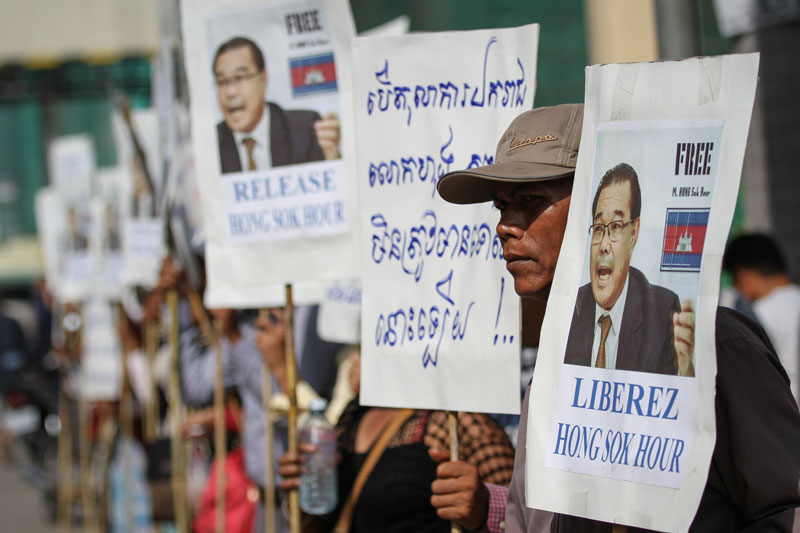The Phnom Penh Municipal Court decided Wednesday to reinvestigate the origins of the doctored treaty that provided the impetus for the arrest of opposition Senator Hong Sok Hour, after the senator’s lawyer told the court that his client did not forge it.
Mr. Sok Hour was arrested on August 15, two days after Prime Minister Hun Sen ordered his arrest after seeing a Facebook video in which the senator presented a doctored treaty between Cambodia and Vietnam purporting to reveal a 1979 deal to dissolve their mutual border.

On the first day of his trial for forgery and incitement on Friday, Mr. Sok Hour told the court he did not alter the treaty but rather found it after Googling “1979 treaty,” and had never intended to stoke unrest.
During the second hearing Wednesday, Mr. Sok Hour’s lawyer, Choung Choungy, presented the senator with a printout of what he said was an identical treaty to the one his client had shown in the video.
“Please, see whether this is the real document that you posted to Facebook,” Mr. Choungy said, explaining that he had Googled the offending treaty himself. “I found this document based on what my client said.”
After Mr. Choungy insinuated that the printout proved his client had not forged the fake treaty, deputy prosecutor Sieng Sok asked the court to disregard the document and look into it at a later time.
“Please, judge, decide to reinvestigate this document,” Mr. Sok said. “The court does not have the skills to research this document. So please, judge, order the experts to find out more about this document.”
Mr. Choungy replied that no such expertise was required and that he would be happy to guide the judge in Googling “1979 treaty” and finding the document online for the whole courtroom to see.
“Judges have the right to find inculpatory evidence and exculpatory evidence, so please, judge, continue this hearing,” he said, “because if you allow us to open the projector and connect to the Internet, I will tell you the way to find [the document] quickly.”
Presiding Judge Ros Piseth replied that he would do no such thing, and instructed Mr. Choungy to provide him the details of how Mr. Sok Hour claims to have accessed the document for the court to look into.
“[The court] decides the defense should clearly specify the date of the document that was downloaded from the Internet,” Judge Piseth said.
“Please clarify what type of machine or materials were used to download the document,” he added. “[We] will provide it to an investigating judge at the Phnom Penh Municipal Court.”
Outside the court, Mr. Choungy said the decision to wait to check the treaty’s origin was wrong. “It’s not correct because I was prepared to show the court exculpatory evidence, but I could not,” he said.
Human Rights Watch has said they believe Mr. Sok Hour’s document to be a poor translation back into the Khmer language from a translation of the original treaty into either English or French.



